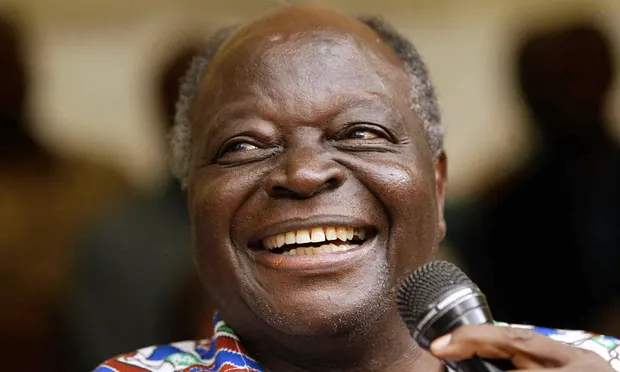Mwai Kibaki, who has died aged 90, stood at the crossroads of fundamental political change in Kenya, often without knowing the scale of the forces he was helping to unleash.
He served as the country’s third president, from 2002 to 2013; his most meaningful reform was the introduction of free primary education. But corruption dogged his administration and constitutional issues, particularly in terms of how much power should be vested in the presidency, often dominated.
In 2007 Kibaki won elections that no major external observer group felt able to validate as free and fair, and as a result, huge violence broke out across Kenya, much of it in the shape of ethnic conflict. It took the intervention of the former UN secretary-general Kofi Annan to force a compromise in which Kibaki retained the presidency while his political rival, Raila Odinga, became prime minister.
A subsequent rewriting of the Kenyan constitution reduced the powers of the presidency considerably, and a chastened Kibaki turned his technocratic skills to reforming and reviving the national economy. He achieved economic growth against considerable odds and was able to revitalise parts of the country that had previously been overlooked by governments seeking only electoral support.
Although corruption remained untamed and the spectre of ethnic favouritism was never fully diminished, by the time he left office Kibaki could claim to have transformed and modernised the Kenyan economy along more inclusive lines, and – even if it was forced on him – to have presided over an equally important overhaul of the country’s constitution.
Kibaki was born in the village of Gatuyaini to Kibaki Gĩthĩnji and Teresia Wanjikũ, who were peasant farmers. Showing early academic promise, he went to Mang’u high school before moving on to Makerere University in Uganda, gaining first class honours in economics and then going on to the London School of Economics, where his postgraduate studies focused on public finance.
Returning to Africa, Kibaki taught at Makerere until 1961, when he joined the Kenya African National Union party (Kanu) as an executive officer and began his career in politics as Kenya became independent in 1963. Kanu dominated in the early days of the country’s single-party state, and Kibaki quickly rose through its ranks. By 1969 he was minister of finance under the first president, Jomo Kenyatta, and under Kenya’s successor, Daniel arap Moi, he also held ministerial portfolios, becoming vice-president from 1978 to 1988.
However, after Kenya reverted to a multiparty system in 1991 – following much pressure from the populace – Kibaki soon abandoned Kanu and declared himself the founder of the Democratic party, one of a host of new opposition parties.

In 1992 and 1997 he lost to Moi in the presidential elections, mainly due to division within opposition ranks, but he carried on as leader of the official opposition from 1998 to 2002, when finally – in an alliance of parties – he succeeded in winning the presidency.
Unlike his predecessors, Kibaki never sought to embed himself in a personality cult, and his image was of a quiet, gentlemanly technocrat. However, during his first term it was generally felt that corruption increased, and his undemonstrative demeanour meant he was unable to achieve great personal popularity with the electorate, despite his early introduction of free primary education across the country.
When Kibaki lost a referendum that would have introduced more sweeping presidential powers, it became clear that the electorate was already tiring of an administration in which Kibaki’s supporters and Kikuyu kinsmen felt it was their “turn to eat”, as the popular phrase went. At the same time, support grew for a more diversified constitutional system that could usher in greater equity in development and economic progress.
All of this meant that Kibaki faced an uphill battle during the 2007 presidential elections. Heading a new coalition of parties, he faced a formidable opposition led by Odinga and all the opinion polls, including one commissioned by the US government, had his rival ahead. Early counting also had Odinga winning the election, but somehow Kibaki turned the tables and cries of fraudulent intervention in the count began to gather volume, with external observers doubting the result’s credibility.
Before the election had been held, Kibaki and Odinga had mobilised nationwide gangs of party supporters, ready to swing violently into action in the event the result went against them. After the election Kenya was plunged into political conflict, with more than 1,000 deaths and hundreds of thousands displaced from their homes.
It took the intervention of Annan, at the behest of the African Union, to force the non-constitutional compromise in which Kibaki kept the presidency but Odinga was made prime minister. Against Annan’s background threat of indictments before the international criminal court, a resultant rewriting of the Kenyan constitution involving a team of jurists drawn from several African jurisdictions reduced the powers of the presidency greatly.
Working under a new constitutional framework and without the possibility of running for the presidency again, Kibaki turned his attentions to the economy, and despite being hampered by the global financial crisis of 2008 was able to make progress. Some of the work had begun in his first term, but he was able to make a much greater and wider-reaching difference in his second stint with the help of his coalition partners. His successor, Uhuru Kenyatta, praised Kibaki as a transformer.
Kibaki married Lucy Muthoni in 1961; she died in 2016. He is survived by their four children, Judy, Jimmy, David and Tony.
In 2005 the Kenyan media reported that Kibaki had a second wife, Mary Wambui. She was a political activist in his party whom he had allegedly married under customary law in the 1970s. Wambui frequently appeared as if she were the first lady, but Kibaki always denied that she was his spouse.














